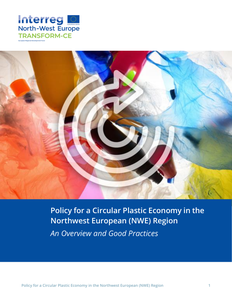This document combines four reports on existing regional business support programmes for inclusion or understanding of circular economy (CE) objectives, deliverable DT3.1.2 from the transform-CE project. Besides a general overview on national and regional level, the focus is on a selection of national and regional programmes aimed at the plastics industry. After explaining the format to structure the programmes, the results for the four regions are presented: Greater Manchester (UK), Rhineland Palatinate and North-Rhine Westphalia (DE), Wallonia (BE), Central Netherlands (NL).
MULTIFILE

This paper focuses on utilizing the Celciushouse as an escape room in energy education. In a broader context, it also addresses the incorporation of serious gaming in education. The project is part of COVE SEED. SEED - Sustainable Energy Education, aims to develop innovative vocational education and training, working with experts from five different European regions to phase out fossil fuels and contributing to Europe becoming a fossil free energy continent. SEED is a CoVE (Centres of Vocational Excellence) programme. CoVE’s are part of the Erasmus+ program aiming to establish transnational platforms on, among others, regional development, innovation and inclusion. SEED combines education on various international levels including level 2,3,4, and 6. At this moment, the project ESCAPEROOM IN ENERGY EDUCATION is still in its initial phase. With this paper and the accompanying workshop, we aim to gather insights from other international regions involved in the SEED project collaboration. The acceleration of technological developments means that what is learned today may be outdated tomorrow. Therefore, it is essential for educational institutions to focus on developing general skills such as critical thinking, problem-solving, and the ability to quickly absorb new information. The market demands professionals with modern knowledge and skills. Techniques taught to students today may become outdated tomorrow. Therefore, the ability to learn how to learn is becoming increasingly crucial. Analytical and research skills are therefore gaining importance. It is also essential for students to utilize various learning methods. Not just learning from books but particularly learning from practical experience. Practice-oriented learning, where students gain direct experience in real situations, not only reinforces theoretical knowledge but also develops practical skills that are valuable in the job market. To tackle these problems, serious gaming or the establishment of escape rooms can be a solution.
MULTIFILE

Green Hydra main scope is to improve policies from 10 regions of different types and levels - national, regional or local - to establish support initiatives and measures for opening the access of SMEs to green H2 development projects, from research programmes to development strategies, awareness-raising schemes, and pilot investments especially focused on involvement of SMEs across the whole hydrogen value chain, including R&D, engineering, manufacturing, consultancy, human resources upskilling and design.The specifc objectives are:- probing the conditions for using green H2 in the key sectors involving SMEs- identifying the potential key factors to activate the involvement of SMEs around the green H2 value chain- supporting for the creation of a production chain involving SMEs- developing new skills, knowledge and communication for green H2 for SMEs- easing SMEs access to fi nance in the fi eld of green H2- upscaling innovations for SMEs related to green H2 products and services